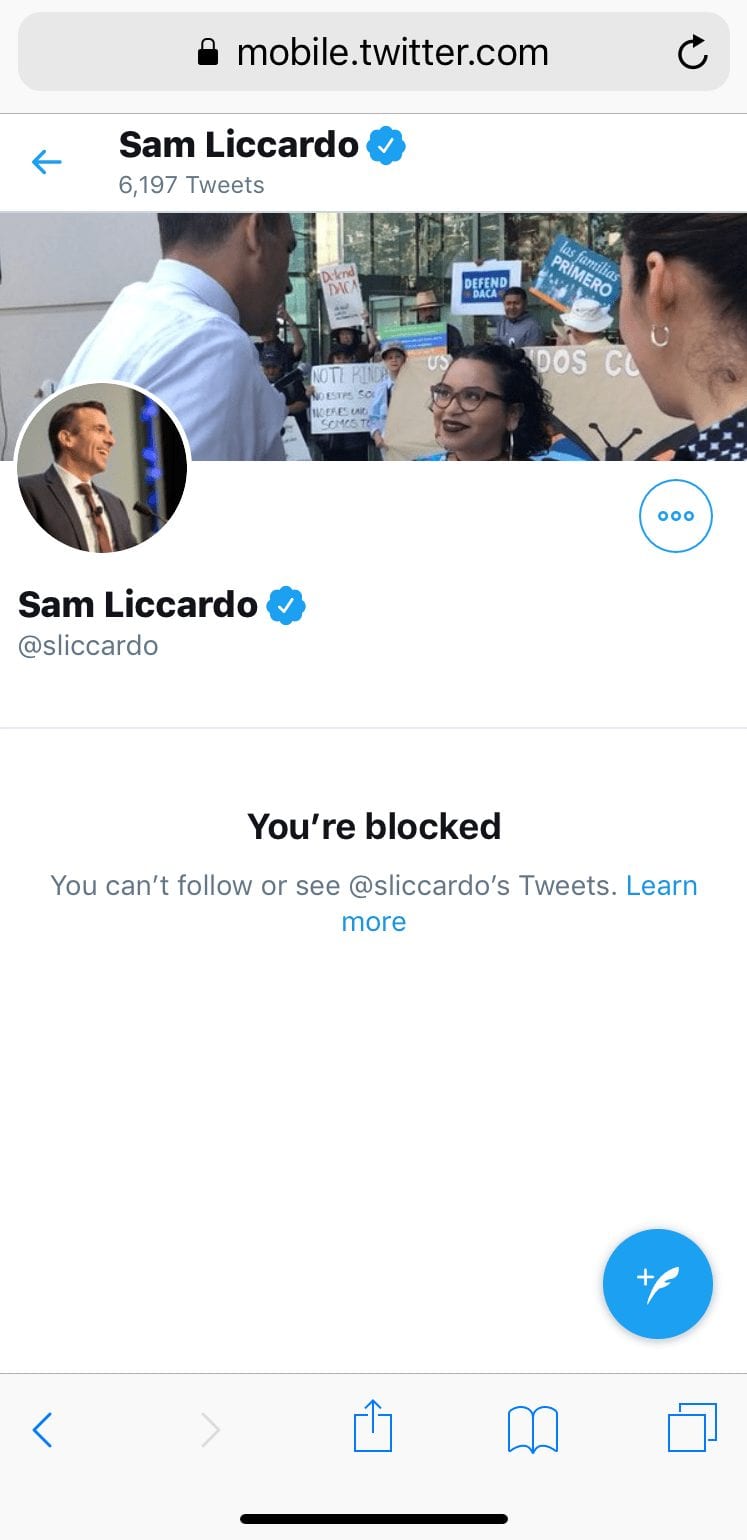A federal appeals court upheld a ruling last month that President Donald Trump violated the First Amendment by blocking critics on Twitter — prompting San Jose Mayor Sam Liccardo to begin reinstating hundreds of social media users he’s blocked on Twitter and Facebook, a move that one good government advocate said is “better late than never.”
On July 9, the Second Circuit Court of Appeals agreed with a lower court’s decision that blocking people is unconstitutional because Trump regularly uses his @realdonaldtrump Twitter account to discuss policy, politics and his presidency, so the feed is essentially a public forum. That means the president can’t silence his critics by banning them on social media without trampling their constitutional rights.
The ruling could have far-reaching implications for how local elected officials like Liccardo block their critics online. This news organization asked for a list of the blocked Twitter and Facebook accounts for all 11 members of the City Council, including Liccardo.
The mayor was the only one who returned any records — the other members said they did not ban anyone on social media. Liccardo’s office turned over a list that showed 177 accounts were blocked from his official Twitter account and more than 300 users were blocked on Facebook.
More than 250 of those Facebook accounts were blocked in a single week in June 2016, starting two days after a protest outside a Trump rally at the San Jose McEnery Convention Center turned violent.
“Following the violence at the 2016 San Jose Trump rally, Mayor Liccardo’s social media accounts received a noticeable increase in threatening, profane, and abusive messages and comments,” said Ahmad Chapman, a spokesman for the mayor. “We would expect that due to this increase, communication team members at the time would have blocked more people.”
The list of blocked Twitter users provided by the mayor’s office doesn’t show when they were blocked. And while it does include some accounts that are obvious bots or trolls — the mayor has also blocked San Jose-based poet, Janice Lobo Sapaigao and Atlanta-based mystery novelist Gerrie Ferris Finger, both of whom seem to frequently tweet about their writing.
But perhaps more troubling, Liccardo blocked Joshua Molina — a former Mercury News reporter who penned a political column called “Internal Affairs” when Liccardo was a rookie councilman. The weekly column had a more snarky tone than regular news stories and often featured inside City Hall information from “IA spies.”
Molina wrote a column in 2007 that focused on a budding political bromance between Liccardo and his fellow freshman Councilman Pierluigi Oliverio, comparing the pair to “teenage boys in the back of class.” He also covered Liccardo’s falling out with Councilman Pete Constant in 2008 over issues such as affordable housing and bottled water. Oddly, its appears that Molina was blocked by Liccardo five years after he had left the newspaper and no longer covered San Jose politics.


“Perhaps a story I wrote upset him,” he added. “Regardless, it seems silly and totally unnecessary for the mayor of the 10th biggest city in the country to block members of the media. I think he has bigger issues to be concerned about.”
In the recent Trump ruling, the court applied the analogy of a public forum — such as a City Council meeting — to a virtual space, said First Amendment Coalition Executive Director David Snyder. Banning social media accounts that post threats of violence is one thing, Snyder added, but when government officials block poets and political reporters, it could be a violation of basic freedoms.
Those public forums cannot be “exclusive with respect to different political points of view,” Snyder said, just as public officials can’t stop protesters from entering a City Council meeting because of their politics. But if their protests become violent or disruptive, it would not necessarily be a violation of their civil rights for city officials to remove them.
The same applies online, Snyder said. Public officials who block social media users are removing protesters from the forum, but can get away with it if they use a set of criteria that is “universally applicable in a way that doesn’t engage in viewpoint discrimination.”
But that does not appear to be the case with Liccardo’s social media accounts. Until 2017 the mayor allowed his communications staff to block people on social media at their discretion, using subjective guidelines.
“Before May 2017, blocking was done at the discretion of members of the communications team,” Chapman said. “Generally, the parameters that communications staff used in making these decisions were: abusive behavior, targeted bullying or harassment, and profane language and speech toward other users.”
The mayor’s communications staff stopped blocking Twitter and Facebook users in May 2017, Chapman said, a year before a federal judge in the Southern District of New York ruled that public officials like Trump can’t engage in “viewpoint discrimination” on social media. But they didn’t start reinstating users until last month when that ruling was upheld.
Chapman said Liccardo’s staff started “unblocking” accounts shortly after the New York-based court’s decision and the process should be complete within 30 days of the ruling.
“I think it’s good that he’s bringing his social media policy in line with the First Amendment,” said California Common Cause Executive Director Rey López-Calderón. “I’m surprised he didn’t know better as a lawyer. But better late than never.”
Contact Adam F. Hutton at [email protected] or follow @adamfhutton on Twitter.



Leave a Reply
You must be logged in to post a comment.